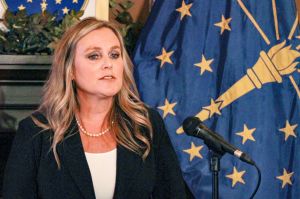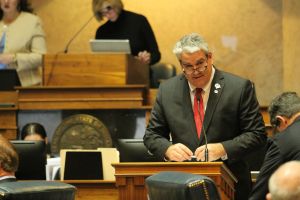
With legal and industry action unfolding at home, and more efforts advancing in Washington, Indiana’s lawmakers are hesitant to go further — but some advocates want more. (Courtesy National Cancer Institute via Unsplash)
Indiana lawmakers went on the offensive when they limited physician-employer noncompete agreements for the second time in three years — but with a lawsuit pending and an industry adjusting, they’re sitting back to observe before doing more.
And still-unfolding national efforts could supersede it all.
“I’m hopeful, maybe, but I think it’s more of a sit and wait,” said Sen. Justin Busch, the Fort Wayne Republican who authored this year’s legislation.
Noncompete agreements bar employees who leave their jobs from working in similar positions within a certain timeframe, and often, a geographical range. In Indiana, physicians working under such agreements must purchase their freedom for a “reasonable” price.
But as of July, they may have more options.
That’s when Busch’s Senate Enrolled Act 7 went into effect. It banned new agreements for primary care physicians, blocked enforceability for all physicians in some cases and outlined a mediation process for physicians and employers struggling to agree on a buyout price.
Read more: A lawsuit may put Indiana’s new physician non-compete restrictions to the test
Good for whom?
Indiana — in the midst of a crisis over the cost of health care and persistently low public health metrics — has limited its noncompete-related legislative efforts to the health care industry.
The industry says it uses such agreements to protect the sizable investments to support physicians: buying equipment, maintaining specialized workspaces and so on.
But there’s evidence the agreements hinder worker mobility and decrease wages, according to Kenneth Dau-Schmidt, a labor and employment law professor at the I.U. Maurer School of Law.
And some question the degree to which physicians willingly and knowingly agree.
Larger healthcare organizations prefer to use standardized template agreements with terms consistent across an entire staff, said Kathleen DeLaney, an Indianapolis labor attorney.
“They like to say, ‘We don’t make exceptions, because if we make an exception for one doctor, then the next doctor is going to want an exception,'” DeLaney said. “So the doctor’s negotiating leverage is somewhat limited by that.”
And, she added, doctors often sign without getting legal advice: a no-no, since they don’t always understand the implications of the agreements.
And while many employers will tell applicants the job comes with a noncompete agreement, some don’t, said Dau-Schmidt. He didn’t refer specifically to Indiana employers.
“Some of them will wait until after you have taken the job,” he said. “At that point, you’ve already moved your family, you’ve already given up your old job. Unless you want to immediately start looking for another job, you’re going to sign it.”
Fighting over the need for the noncompete
Lawmakers first took on the topic in 2020, with legislation stipulating various provisions a physician’s noncompete agreement must have to be enforceable.
Most relate to the departing doctor’s patients and medical records. One requires that agreements contain the option of “buying release at a reasonable price” — but didn’t originally define what counts.
House Enrolled Act 1004 applies only to noncompete agreements that physicians have entered since July that year.
Lawmakers attempted to revisit the topic in later legislative sessions.
Success took three years, hours of discussion and compromise: employers worried the legislation would go too far, while doctors and advocates feared it wouldn’t do enough.
Lawmakers ultimately carved specialized physicians out of the ban on new noncompete agreements — applying it only to primary care physicians — but kept the scenarios that would invalidate an agreement applicable to all.
Those are if an employer terminates a physician’s employment “without cause,” if a physician leaves the job “for cause,” or if the contract is expired and fulfilled.
Rep. Ethan Manning, a House cosponsor of the bill, said the term “primary care” can be defined “pretty broadly.” And he hoped physicians would use that language to their advantage during negotiations.
“As far as litigation goes: personally, I hope it’s interpreted as broadly as possible,” Manning, R-Logansport, added.
Legislation sparks lawsuit and voluntary changes
Days after SEA 7 went into effect, a Hoosier doctor sued his employer to get out of a noncompete agreement: the law’s first real-world test.
David Lankford is a Fort Wayne physician who previously worked for Lutheran Health System. In his lawsuit, he alleged that Lutheran laid off its non-intensive pediatric hospitalists and shifted those doctors’ work to him and other intensivists.
He — and his lawyer, DeLaney — say that work was outside the scope of his contract, and argue that makes his noncompete agreement unenforceable under the new law.
Lutheran, meanwhile, says there was no breach of contract and the noncompete agreement is still effect. And the system says it was “directly harmed” when Lankford went to work for a “direct” competitor.
Lankford won a temporary restraining order allowing him to work elsewhere, but hopes to secure a preliminary injunction while the case continues.
The judge, DeLaney said, has options in making the final decision: “It’s possible that the decision would be really limited to the unique facts situation of our case. (Or) he might … interpret the law in a way that fleshes out what it means.”
Or, she continued, “It could be both, or it could be neither.”
Meanwhile, some health care organizations are making changes beyond the law’s requirements.
Eskenazi Medical Group, Indiana’s sixth largest provider coalition, announced in June that it would end the use of noncompete agreements for its employees.
The group told the Capital Chronicle that “equity” was the biggest factor in the decision.
“Eskenazi Medical Group did not want to navigate various agreements depending on provider,” it said in a statement. “Furthermore, we felt the requirement to give 120-day notice upon separation gives us ample time to remedy or mitigate any other issues that are typically addressed in a non-compete.”
The state’s largest health care system, Indiana University Health, is also assessing such a move — although it hasn’t yet come to a decision.
“IU Health continues to evaluate this topic in the rapidly changing healthcare environment in Indiana,” the system said in a statement to the Capital Chronicle. “We will ensure that we are able to recruit and retain outstanding talent to take care of all Hoosiers who trust us with their care.”
Unclear Hoosier future
Though lawmakers are preparing for the next legislative session, it’s unlikely more limits on noncompete agreements will be among the proposals.
Busch said he wanted to let legal and industry developments play out.
“I kind of want to see what the courts decide,” he said. “Sometimes we (legislators) tend to tweak too much and get in our own way.”
Rep. Rita Fleming, an obstetric hospitalist representing Jeffersonville, said she additionally wanted to see how SEA 7 impacts rural hospitals.
“Rural health is under a threat,” Fleming, a Democrat, said. “… The the hospitals are barely hanging on in many areas. And so I think it’s going to be critical to see how this can impact their recruitment.”
There’s more lawmakers could do short of a total ban, according to Dau-Schmidt: restricting noncompete agreements for employees earning lower incomes, or for workers in more professions.
Busch wasn’t opposed to future action.
“I think it’s probably best for us to pause this session, but I’m certainly open to expanding it … Some nurse practitioners and other health care professionals also have these restrictive noncompetes,” he said. “I would look at that in the future if I thought that was a legislative possibility.”
But Busch said further action would be an “uphill climb” given the opposition this year’s legislation faced. Passage, he added, was a “Herculean effort.”
National moves pending
Washington, too, is taking on noncompetes. And proposals there go further.
U.S. Sen. Todd Young of Indiana is a sponsor of a reintroduced bill banning noncompete agreements — old and new, irrespective of industry — with some exceptions.
“Too many workers, across sectors, are subject to non-competes that limit their ability to advance their careers or find a better job in the same field. Even some fast food chains have made their employees sign non-compete agreements,” Young said in a statement to the Capital Chronicle.
The legislation has bipartisan support, but has failed to advance in previous years.
Meanwhile, Young’s home state pushed a bill through successfully, but limited by time period and profession.
Asked for his takeaways, Young said he’d “work hard to make sure my colleagues are armed with information on how the Freedom to Leave is good for their constituents” — and that he’d be ready to “address concerns” and “make compromises.”
“I try my best not to weigh in on state legislation, but I’m glad that the General Assembly decided to look at this issue,” Young said.
And the Federal Trade Commission in January proposed a rule banning employers from entering, maintaining or enforcing a noncompete agreement with workers, or lying to them about a noncompete being in effect.
It would apply to paid and unpaid employees, and would include independent contractors.
The rule, the commission said, is “based on a preliminary finding that noncompetes constitute an unfair method of competition,” violating federal law.
The commission is expected to vote on the proposal in spring of 2024.











